- Home
- Vanessa Curtis
The Earth Is Singing Page 7
The Earth Is Singing Read online
Page 7
Mama’s own eyes fill with tears. It is too late. I realize now what my words have just done to her.
“I am sorry, Hanna,” she says in a voice kept firm with a lot of effort. “We have already had this conversation. You are my daughter and we can’t change that fact. And you should be proud to be Jewish.”
I dissolve into fresh tears.
“Proud?” I say. “When I am made to walk in the gutter and wear this STAR” – and here I rip off my jacket and hurl it across the room – “and I have to leave dance school and I never even see Uldis any more?”
I wish I hadn’t said that last bit. It’s a private pain that’s been worrying me for ages. Mama has told me that it’s very difficult for non-Jews to visit Jews now without risking their own safety and maybe even their lives. But I miss Uldis so much that my stomach hurts and I don’t want him ever to see me in the same way that Velna and Helena do.
Dirty Jew.
Mama gets up very deliberately as if it is a superhuman effort to move in the face of my outburst. She picks up my jacket from the floor and hangs it on the back of my bedroom door.
As she does this I see with a jolt that my suitcase is down from the top of my wardrobe and waiting at the end of my bed.
“What’s that doing there?” I say. My heart is lurching. For one crazy moment I think that Mama is evicting me from the apartment for staying out too long. But then as I look out into the tiny hallway I see Mama’s small red suitcase packed by the front door along with Omama’s black one.
“We are leaving,” says Mama. “I do not want us to move into the Jewish ghetto. There will not be enough food. Besides, it is in the Maskavas area of town.”
I shudder. So they are making us a ghetto, just like in Poland.
The rumours turned out to be true.
I know the Maskavas area. That is the place where all the poor Russians live. Their houses are run-down and basic and look like they are made of slatted cardboard. The houses there have no proper heating or water supplies.
“But at least we would be together and with other Jews,” I say. “That can’t be so bad, can it? If we leave and go somewhere else, won’t we be in even more danger?”
My head is whirling. All the way back from the park I could only think of how good it would feel to get back to this apartment and to the safety of my family, or what’s left of it. Even though it is not as good as our beautiful villa, it is starting to feel a bit like home.
Mama lugs my suitcase into the hall and puts it next to the other two.
“There is no guarantee we would stay together in the ghetto,” she says. “And there are rumours that people might be sent further east to camps. We could be split up for good. So Brigita has agreed to take us in. It is good of her. We leave tomorrow night.”
And the way she says it leaves no room for argument.
Aunt Brigita is Papa’s younger sister.
She still lives near to our old house in the Mežaparks area of town in a pretty villa with a garden and four bedrooms. She is married to Georgs and they have no children, just a selection of horrible miniature dogs with short legs and sharp, abrasive barks.
When Papa was still around he avoided Brigita for most of the time. Even though she was his sister they were as different as black bread and matzo. Papa is gentle, laid-back and charming. Brigita is sharp-tongued, impatient and bossy. Her visits always leave Mama plagued with headaches and exhaustion.
Omama can’t stand her and always disappears off somewhere else.
“That bony bird gives me the jitters,” is all she says.
Brigita hadn’t visited us for ages, but then she was here at night-time with Uncle Georgs just over a week ago. I heard her thin, insistent voice arguing with his deeper one when I was supposed to be asleep in bed. I guess that’s when Mama hatched her plan.
My aunt does not much like children. When I am left in a room with her I struggle to know what to say. We sit far apart on the sofa and the silence hangs heavy and slow. I reckon she always wanted Papa to marry a rich Latvian widow rather than a struggling Jewish seamstress with a crazy old mother. She disapproves of me wanting to be a dancer, too.
“How will you find time to look after a family if you have a career?” is what she said last time I tried to share my ambitions with her. Aunt Brigita is obsessed with money. She thinks that women should stay home and men should earn all the money. Georgs earns a good salary at one of the largest banks in Rīga and he has even kept his job throughout the Soviet and Nazi occupations and the nationalization of his workplace. Omama mutters in a dark voice that he is probably in league with all sorts of undesirable political parties but in fact Uncle Georgs is a hard worker and a clever man.
He is also far nicer to me than Aunt Brigita ever is. She just uses his money to feed the best cuts of meat to her revolting dogs.
And now we are going to live with them all.
The next day is strange.
We are all packed up and so we wear the same clothes we wore yesterday. There is no food left except for a few hard bits of bread so Mama toasts them up and tries to make them more palatable by sprinkling caraway seeds all over them but I still nearly choke on the first mouthful.
I feel like a caged animal cooped up in the flat, so in the afternoon I persuade Mama to let me go for a walk down our street.
Mama is very doubtful after my late arrival home yesterday but in the end she looks at my pale skin and the circles under my eyes and agrees that I should get a breath of fresh air.
“Just up and down this street,” she says. “Wear your star and stay off the sidewalks. Ten minutes. If you don’t come back by then I will have to come and find you. And, Hanna. Don’t tell anybody of our plans. And I mean – anybody. Okay?”
“Yes, yes,” I mutter. I hate this. It’s like being a tiny child who can’t be trusted to go anywhere or do anything.
I pull on my black jacket with the yellow star and as usual it makes me feel very Jewish and not like Hanna any more. Then I bolt downstairs and out into the air before Mama has a chance to change her mind.
I walk along the gutter, kicking leaves and staring at my shoes. They are starting to wear thin around the sides and the black leather looks almost grey in places. The shoe shops are not open to Jews now. I don’t know when I will get a new pair.
I am so busy glaring at my feet that I nearly die of shock when somebody says my name.
“Hanna!”
I stop.
There is Uldis, handsome as ever in his uniform.
I could melt. I have missed him so much that it’s taken on a permanent physical ache, like a stomach upset.
“Oh,” I say. “It is really good to see you. But where have you been?”
I feel hot in the face when I say this, but it’s true. I have missed his smooth blond hair and his blue eyes and broad shoulders.
Uldis gives me a brief peck on the cheek.
“I have missed you too,” he says. “It is very risky for me to come and visit you where you live. There are punishments – you know?”
I nod. I do know. I have been hearing horrible stories about people who have risked just that and ended up thrown into the Central Prison.
Uldis looks around and resumes an expression like an empty sheet of paper.
“Where are you going?” he says. “You should not still be in this part of town.”
I nod.
“I know, it is not safe,” I say. “But don’t worry. I will be all right. We have plans…”
I don’t finish the sentence. Already I have said too much.
What if Uldis turns out to be like Velna? I always thought I could trust her with my life, but now I know otherwise.
I flush, angry with myself. This is Uldis, my beloved Uldis. I have known him since I was a young child. But Mama’s face when she made me promise was as hard as iron and her eyes bore into me like drills. I should not let her down.
Uldis has stopped walking and turned to face me. He puts his han
d under my chin and tilts it up so that I can look into his eyes.
“Same old Hanna,” he says with a smile. “So impulsive and excited, always full of plans for the future. It is why I love you so much, of course.”
My heart leaps into my throat.
What did he just say?
We have never exchanged any declarations of love before.
My chest is thumping hard. I stare deep into those blue eyes, trying to see underneath all the flesh and bone and get right down to the soul, to see if he is speaking the truth.
He stares back with that steady gaze. He reaches down and pushes a stray strand of hair out of my eye.
“Well?” he says. “Aren’t you going to say it back to me?”
He is grinning now.
I feel as if I want to sit down. My legs have turned to pulp.
“Oh – yes,” I stammer. “I do. Love you, I mean. I have done for ages.”
Uldis just carries on staring at me. I love his blue eyes so much that I can’t drag my gaze away.
“Good,” he whispers. “Hanna. If you are going somewhere, you should tell me. I can’t bear not to see you again.”
“Okay,” I say in a whisper back. Then I feel stupid for whispering, as there is nobody else around.
“So you do have a place to stay?” he continues. “That’s good. You will be well taken care of. Where is it? I could try to visit.”
I swallow. Mama’s face floats in front of my eyes again, concerned and drawn with fear. She has lost a lot of weight. Maybe if Uldis brings us good food she will feel well again.
“I am not supposed to say,” I mutter.
Uldis pulls me to him so that my head is resting on the shoulder of his uniform. I can feel the buttons pressing into my cheek.
I stand there swooning in the sunshine with Uldis’s lips on my ear and I am dizzy with confusion. It feels important to hang on to this moment and to hang on to Uldis. I have already lost Papa and dancing and now we are about to lose the apartment too. If I tell him where we are going then at least he can come and see us and maybe as I will be living in a non-Jewish household it will be easier for him to avoid any penalties.
“Okay,” I say. “We are going to stay with my Aunt Brigita so that we do not have to live in the ghetto. But please keep it to yourself.”
Uldis releases me from the embrace.
“Of course,” he says. “Please be careful. These are difficult times. Hanna?”
I am already walking away. My lips are shaking with the effort of trying to hold back a tide of tears. I almost can’t bear to say a proper goodbye to Uldis. It is too painful to consider.
“Yes?” I say.
“Good luck,” he says. Then he blows me a kiss from his hand and walks away.
Uncle Georgs comes for us that night.
He enters the apartment with a worried look on his face. He is wearing his brown hat and smart brown jacket and his shoes are as polished as ever. Everything about my uncle is brown, right down to his brown eyes and brown moustache.
Tonight he does not smile.
“I am taking a risk coming here,” he mutters. “If you could be quick, Kristina.”
Mama gives her brother-in-law a peck on the cheek and nods. She hustles me towards the door of the apartment and then looks at me and stops.
“Hanna, pack your jacket with the star,” she says. “Just for tonight we will not wear them.”
I shoot her a look of amazement but I do as she says. Neither she nor Omama are wearing their stars.
Mama puts a headscarf over her dark hair and ties another one over my plaits. She takes Omama’s arm and Uncle Georgs picks up two of the cases and gestures at me to take my own.
We shut the door to the apartment. It makes a click behind us, even though Mama is trying to be quiet. There is no noise from other apartments because it is three o’clock in the morning, but Mama tells us to creep down the stairs without a sound.
Outside I sniff the early morning air. It has rained and the gutters are gleaming in the semi-gloom. Uncle Georgs’s car is waiting. He throws our cases into the boot, gets into the car and gestures to us to do the same. Mama and I get in the back and Omama is given the front seat as she needs more comfort and legroom.
“If we are stopped,” says Mama, “don’t speak. Leave it to me. We are a Latvian family coming home from a visit to our papa who is in the hospital. Okay?”
“Okay,” I say. My heart is pounding as Uncle Georgs negotiates the roads and drives us out of the centre of the old town and towards Mežaparks. It feels strange to be going back as guests to the area we used to live in. Mama has told me that I must behave at all times in Aunt Brigita’s house.
We pass the acres of green which make up the park and then Uncle Georgs pulls up outside the house I spent a lot of time at when I was little. Same tidy hedge clipped to perfection, same neat white net curtains and smart orange brickwork. This area of Rīga has as yet been left untouched by the Nazis and, in any case, many of the people living here are non-Jews so can go about their daily business as they always have.
It feels like a different world.
My uncle pushes us all up the front path, clutching our bags and muttering under his breath. I notice that his hand is shaking when he puts the key in the door.
He ushers us down the dark hallway and into the kitchen but he does not put on the light.
“Here,” he says, opening the refrigerator. “Brigita left you some sandwiches. She knew you would be hungry.”
Omama snorts at this but she reaches out and makes a grab for a sandwich.
“Is this meat kosher?” she says, waving the bread underneath my uncle’s nose.
My mother sighs.
“Mama, just eat it,” she says. “Be grateful to have good food. For once you will have to put your religion aside.”
Omama almost snarls at this but the smell of the savoury meat and fresh bread is too much for her and she sinks her false teeth into the sandwich with a series of horrible squelching noises.
We sit at the kitchen table in the gloom in our headscarves with our bags by our feet and we eat the sandwiches by the faint light of the crescent moon, shining through Brigita’s white curtains.
When we have finished, Uncle Georgs makes coffee and passes it round.
We drink in silence. He seems nervous and does not want to talk to us, which is odd because in the old days he did nothing but chat to us about his job and his dogs and his lovely house.
The dogs are shut outside in the shed at the bottom of the garden. Uncle Georgs says he didn’t want them making a noise when we arrived.
I guess he just doesn’t want to wake up Aunt Brigita. She probably needs all the beauty sleep she can get.
Uncle Georgs looks up at the kitchen clock about a hundred times a minute and waits for us to finish eating and drinking. Then he takes the plates and cups, washes them up straight away and replaces them all in the cupboard.
I don’t remember my uncle being very interested in cleaning the kitchen before. Then I realize. I think he’s trying to get rid of the tiniest trace of me, Mama and Omama.
“I could have done that, Uncle,” I say. “We must help out while we are here. It is very kind of you to let us stay for a while so that we don’t have to move into the ghetto.”
My uncle turns round from the sink where he is washing around the plughole with a cloth and some spray and gives Mama a searching look, or at least I think he does. It’s hard to tell in the gloom of the unlit kitchen. My eyes are starting to droop with tiredness and I could do with being shown my bedroom.
“You haven’t told her the whole story, Kristina?” he says.
Mama shakes her head in silence.
“What do you take us for?” says Omama. “If we had told her that bit, she might have kicked up more of a fuss.”
I look from one to the other of them in frustration. Everybody seems to talk in riddles these days. I’m nearly sixteen, not five.
“Told me w
hat?” I say. “Please just be honest. I am too tired for games.”
Uncle Georgs gives a laugh when I say this. It is not a friendly laugh but more like the snort of an impatient horse.
“That’s a shame,” he says. “It would help if you liked games, especially hide-and-seek.”
“What?” I say. I am starting to get a sour feeling in my stomach.
Uncle Georgs holds out his hand to me. He is relenting already. I can tell by the way he squeezes my hand and sighs.
“Come with me, petal,” he says. “I will show you your room.”
He pulls me up a flight of carpeted stairs and onto the landing where I know the bedrooms are.
“Will I have to share with Mama?” I say. I can’t remember how many spare rooms the house has.
“Oh yes,” says Uncle Georgs. “I am afraid so.”
I wait for him to open the door of one of the nice bedrooms with their cosy white beds and pretty floral wallpaper. Instead he surprises me. He moves a set of shelves away from the wall and reveals a small door.
Behind the door is a tiny square patch of carpeted landing and nothing else.
My uncle reaches into a corner and pulls out a long stick.
He hooks the end of the stick into the ceiling and pulls down a hidden hatch. There is a silver ladder folded at one end and he tugs at this until the ladder is folded right out and resting on the floor by my feet.
I look at him and then back at the ladder. Maybe my uncle is playing a joke with me. He doesn’t look as if he is finding it very funny, though. In fact even though it is dark I swear I can see that his eyes are shining with tears.
A spider drops through the hatch and hits my face. I scream and brush it off.
“After you,” my uncle says, pointing at the ladder. “Welcome to your new home.”
Chapter Nine
The first night in our new home does not go well.
Uncle Georgs has put three camp beds up under the low attic beams and several times I sit up in the night in a panic and hit my head.
Up here it is stuffy and warm and we are not allowed to open the windows in case we draw attention to the attic. Uncle Georgs has fitted a pair of thick, dark curtains to shield us from view. I lie on my lumpy mattress and sweat for most of the night.

 Virginia Woolf's Women
Virginia Woolf's Women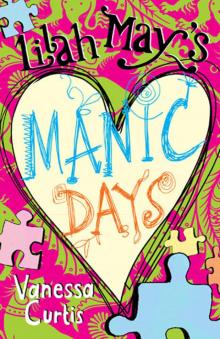 Lilah May's Manic Days
Lilah May's Manic Days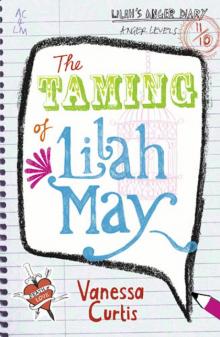 The Taming of Lilah May
The Taming of Lilah May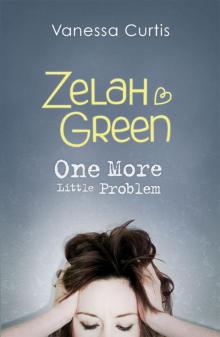 One More Little Problem
One More Little Problem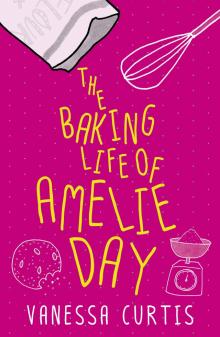 The Baking Life of Amelie Day
The Baking Life of Amelie Day The Earth Is Singing
The Earth Is Singing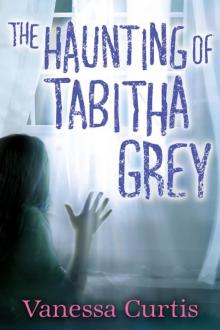 The Haunting of Tabitha Grey
The Haunting of Tabitha Grey